#rules of the dig
Text
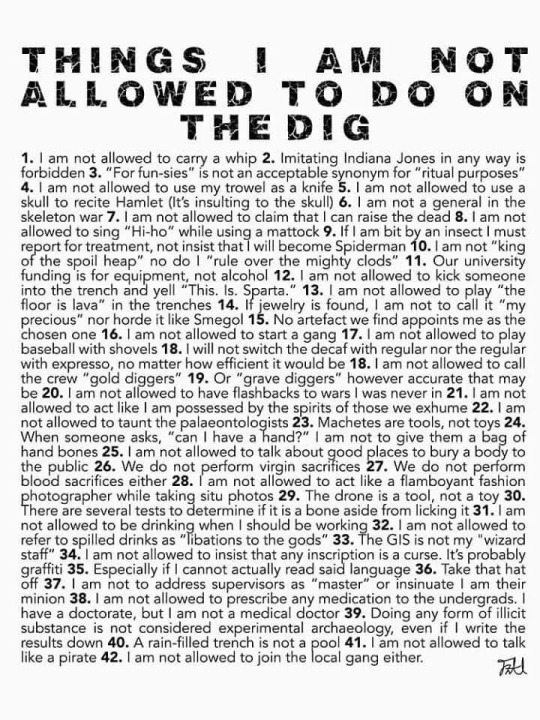
1 note
·
View note
Text


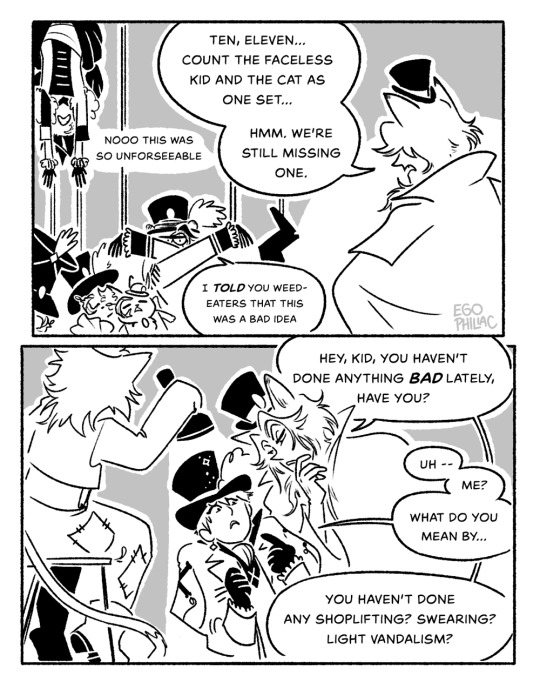
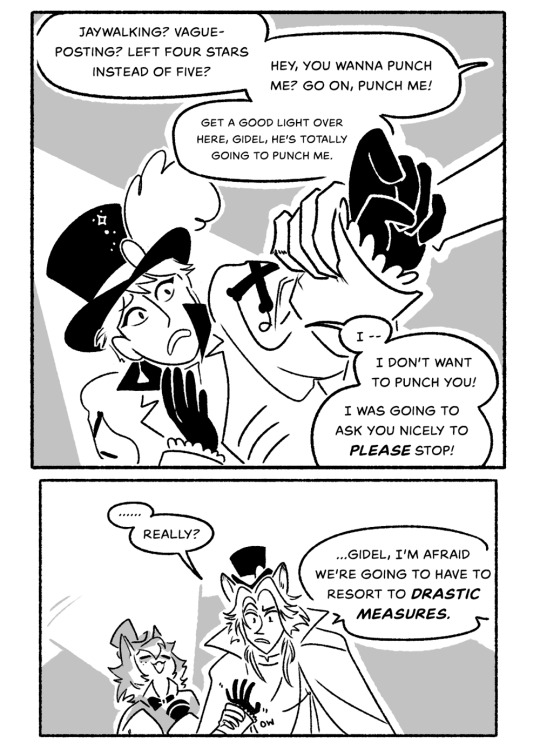
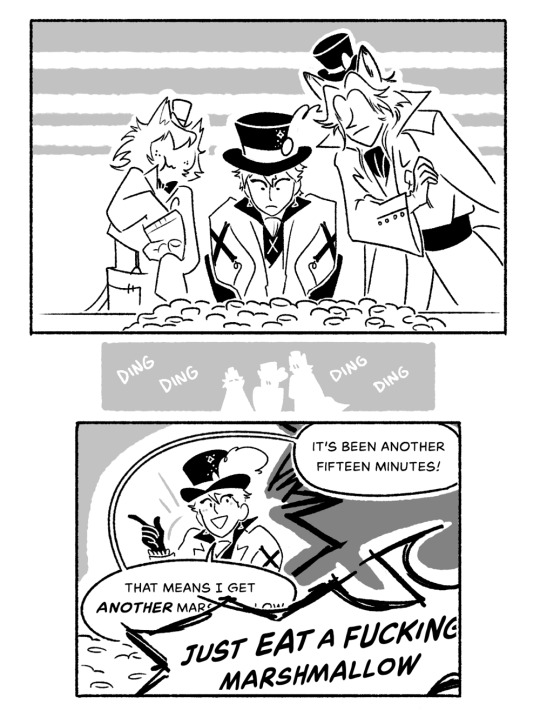
so excited for Kalim to save the day by swiper-no-swiping this dip. you can do it! I believe in you!
god I hope this reads properly
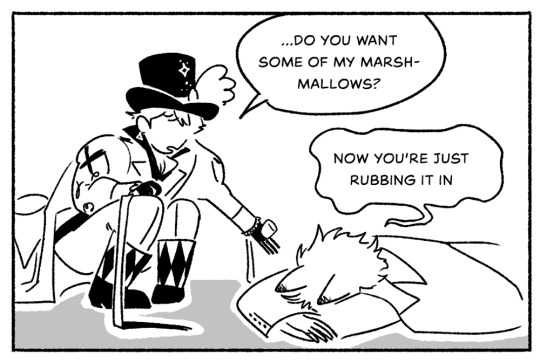
#art#twisted wonderland#twisted wonderland spoilers#stage in playful land#stage in playfulland#i feel like kalim and the marshmallow test operates under roger rabbit rules#whether he passes or fails depends on which option is funniest at the time#anyway HEY things are finally actually happening!#so glad fellow agrees with me there#did he even expect them to make it to the show. did he very quickly have to choreograph a poppy little dance number.#honestly in retrospect i am also shocked that they lasted as long as they did#i mean. floyd is there. c'mon.#speaking of which i did really enjoy floyd going BYE JADE! MAYBE I'LL COME BACK TO SAVE YOU LATER IF I FEEL LIKE IT!#revenge for the popcorn#sorry if this is nonsensical! somehow it became like 4 am while i wasn't looking#i am super digging the evil theme park shenanigans (now that they're actually happening)#it's just Very Late!
4K notes
·
View notes
Text
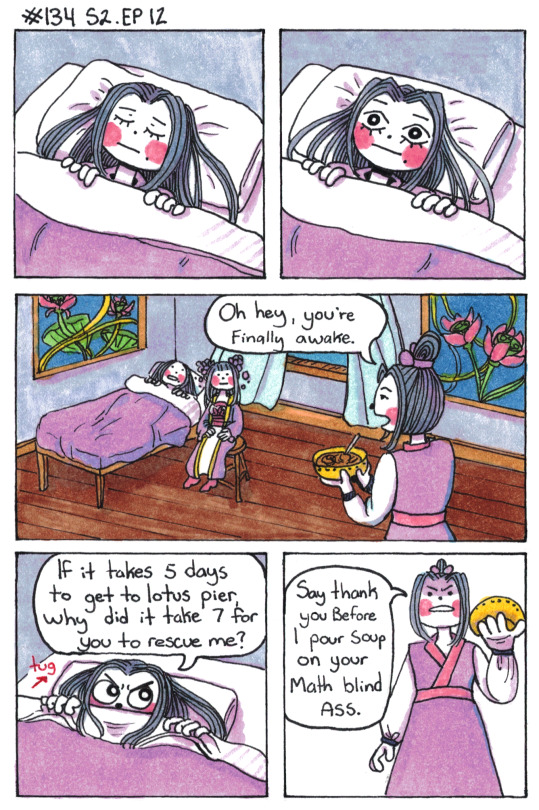
Good Morning, World.
[First] Prev <–-> Next
#poorly drawn mdzs#mdzs#wei wuxian#jiang yanli#jiang cheng#'Good Morning World' because to wwx the jiang household is what grounds him. It is his burrow and blanket.#The familiar soup and banter is his home. The familiar arguments and tension are also his home.#Notice how quickly he throws LWJ to the side once he has JC back in reach! 'He was so boring; I wish *you* were there!'#WWX is very quick to constantly remind himself that he fits within a very specific power structure and role.#He pushes boundaries but almost always only the boundaries that he knows he can push against.#Sitting here now and realizing that if WWX did take life more seriously and act more diligent he would totally usurp JC.#Because the contrast with Them (tm) is wwx is the one that gets in trouble and JC is the one that sticks to the rules.#That responsible appearance especially in contrast is the thin line that holds JC's self-esteem together.#And lets be fully honest. From JC's perspective the last week was also extremely intense and stressful.#It truly was a feat to travel so far so fast despite also being exhausted. Never knowing if it is all in vain.#JC said with his actions 'I would move mountains for you and dig through stone with my bare hands if it meant reaching you.'#and WWX said '[read]'#It's about wwx chronically asking 'why would someone care for me? I'm always tool to be used' than accepting that people love him.
2K notes
·
View notes
Text

The Final Flame 🕯️
—
“We’re all just candles in the dark.”
#candela obscura#critical role#critical role fanart#candela obscura fanart#elsie roberts#ashly burch#circle of tide and bone#the circle of tide and bone#critical role art#floweroflaurelin art#candela spoilers#candela obscura spoilers#critical role spoilers#cr spoilers#CAN YOU HEAR ME SOBBING.#I started this painting at the break and got the caption at the end of the episode#I know it’s not huevember but i make the rules haha#I’m working on three comms simultaneously so there’s been less art from me lately! but candela obscura has a hold on my MIND#also for the beast like. mantis orca locust monster? I just made smth up but I dig it!#me 🤝 raj
1K notes
·
View notes
Text
It is time for me to post what I lovingly call my
“Overly Complicated Mechanism” Theory.
I originally wrote it right after Cat, but Amane trying to commit homicide again reminded me of its existence, and then I forgot about it until now. Anyway…
In short, my theory is this: Milgram’s preventative measures for violence against the Guard could be bypassed if the prisoners used an elaborate Rube Goldberg machine.
With Kazui’s first interrogation, it was heavily implied that the way Milgram actually stops prisoners from attacking the Guard involves a mental block, similar to hypnosis. This means the “invisible barrier” is very likely a result of their muscles locking up from brain signals that force them to stop before they hit the Guard.
The main piece of evidence for this comes from Kazui’s first interrogation, where he tested the limits of the Guard’s, uh… guard. Kazui’s attempt to restrain Es ended with his body suddenly losing strength, as if he himself became opposed to the idea of restraining them.
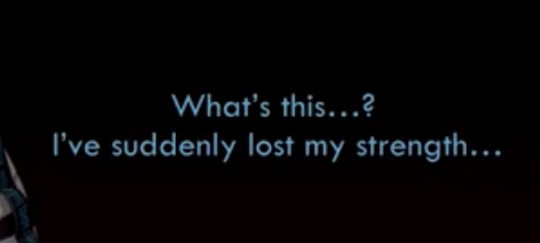
With Milgram’s themes of reinforced and rejected thoughts, I believe the most plausible explanation is a type of mental block instated in the prisoners’ psyches that prevents them from completing actions with the intent to harm or restrain the Guard. (Of course, it’s possible there really is just a magical barrier, but given the results of Kazui’s little experiment and Milgram’s emphasis on altering thought patterns, I think it’s unlikely.) My most pressing question about this is whether the mental block prevents a prisoner from carrying out any action with harmful intent toward the Guard, or if it only stops direct actions.
For example, say Muu wants to hit Es on the head with a rubber mallet. To accomplish this, she comes up with a design for a convoluted mechanism that effectively removes her from the act of wielding the hammer itself. For the sake of consistency, we’ll say the sequence of events is as follows:
Someone tips over a cup. The cup hits a rubber ball, which rolls down a ramp and hits a series of books set up like dominoes, which all fall one after the other. (I don’t have time to do a full illustration right now, but here’s something I sketched out really quick as a visual reference.)

The last book falls off a table onto the pedal of a trash can, which opens the lid and sends a tennis ball flying. The ball knocks over a metal water bottle, which releases the string held in place beneath it.

The string is tied to the rubber mallet, suspending it in midair above a doorframe. Releasing the string also releases the mallet, dropping it directly onto Es, who is (hopefully) standing underneath the doorframe.
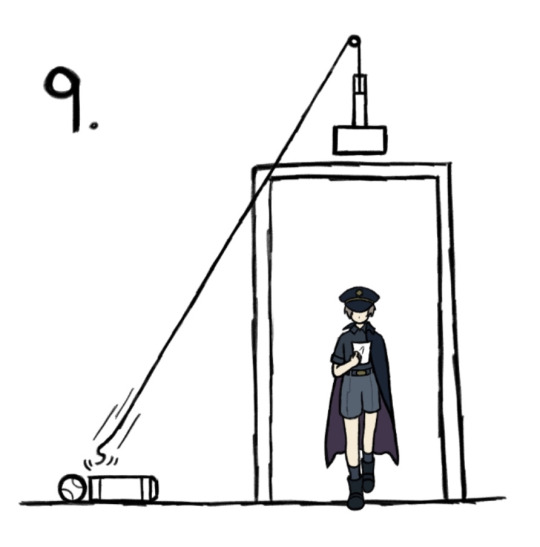
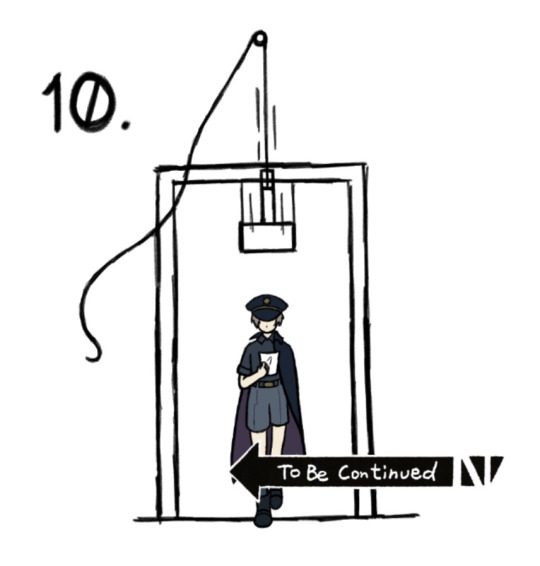
There’s enough steps in the sequence to remove Muu as the one dropping the hammer. However, she would still be acting with the intent to harm the Guard. So, would she be unable to complete the action due to the mental block? If the answer is yes, as I theorize, then this obstacle can be bypassed with another workaround: telling someone else to do it for her.
If she tells Haruka that activating the mechanism will release confetti, and she obscures the mechanism enough that he will be unable to discern the actual purpose, (e.g., covering it with a curtain,) then Haruka would be able to activate it because he is acting without ill intent. Since he is fully convinced that the mechanism will release a shower of confetti, he can activate the chain reaction where Muu would be stopped by the mental block.
This leads to another possible obstacle, though. Would the mental block prevent Muu from building the mechanism in the first place? Since she is making it with the intention to cause harm to the guard, would she be unable to create it? It all depends on just how deep the mental block runs.
Based on what we’ve witnessed so far, I’m guessing that the mental block doesn’t extend quite that far. As seen with Fuuta, Kotoko, and Kazui, (and now Amane as well,) the prisoners are still capable of acting with the intention to harm Es; the mental block just stops them from completing the action. In other words, they can try to punch Es, but they’ll be forced to stop right before hitting them. Similarly, Kazui’s attempt to restrain Es was possible at first, but he quickly lost the strength to do so.
It is likely that Muu would be able to build the mechanism in the first place, but attempting to activate it in order to hit Es would result in either her suddenly losing the strength to do so, or another “invisible wall” where her muscles lock up right before she can tip the cup over.
If Muu lies to Haruka about its true purpose, however, Haruka will be able to activate the mechanism in her stead, and the hammer will successfully hit its mark, provided Es is standing in the right place.
So here’s how they could kill Es with a banana peel…
#milgram#es milgram#listen. i really like digging into the details of how plot mechanics work.#figuring out the rules of a vague convenient power is one of my favorite hobbies.#yes i wrote all this just to end with that punchline.#milgram theory
177 notes
·
View notes
Text

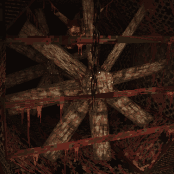




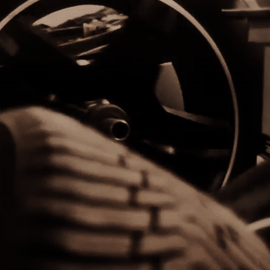


karl heisenberg (resident evil 8) stimboard for Me :•]
[ID: A 3x3 stimboard of 9 GIFs that are all dark and desatured red-orange.
GIF 1: A closeup of a shovel digging a hole.
GIF 2: A video game rendering of an industrial fan spinning behind a bloodied grate.
GIF 3: First person POV of walking into an abandoned factory and looking up at abandoned machinery.
GIF 4: A system of wheels and belts connecting them turning in tandem.
GIF 5 (center): Karl Heisenberg leaning down and talking into the player's face, gritting his teeth.
GIF 6: A closeup of a magnet being slowly lowered to a tray of ferrofluid that spikes up to reach it.
GIF 7: A panning shot taken behind a pile of tires of a car wheel spinning.
GIF 8: A gloved hand tightening a wing nut on a piece of metal.
GIF 9: A rusted metal tank being crushed in an industrial shredder.
End ID]
#scopostims original boards#stim#stimblr#stimboard#stimmy#rust#metal#industrial#mechanical#ferrofluid#factory#shovel#digging#karl heisenberg#resident evil 8#sorry who am i to turn down a rust colour palette. it's so awesome#also i think the third ever stimboard i made was also him so. returning to my roots aldkfjalskdfja#also center gif was made by me and i immediately ignored all my optimization rules for it so if you use it. sorry it's unnecessarily#large. i treated it like my not stim gifs and left it with a huge file size akldfjalskfdj
85 notes
·
View notes
Note
I just found out that the Guillermo everyone is talking about isn't Guillermo del Toro and he isn't starring in a vampire comedy slash gay romance movie :(
wifeswap au where guillermo de la cruz and guillermo del toro trade places for two weeks
#wwdits#what we do in the shadows#if I remember correctly you have to follow the other persons rules for a week then the second week you impose your own#del toro spends the second week ordering naughty vampires around and digging up ancient lore#de la cruz directs a movie#‘a body decomposed for that long wouldn’t look like that’
186 notes
·
View notes
Text


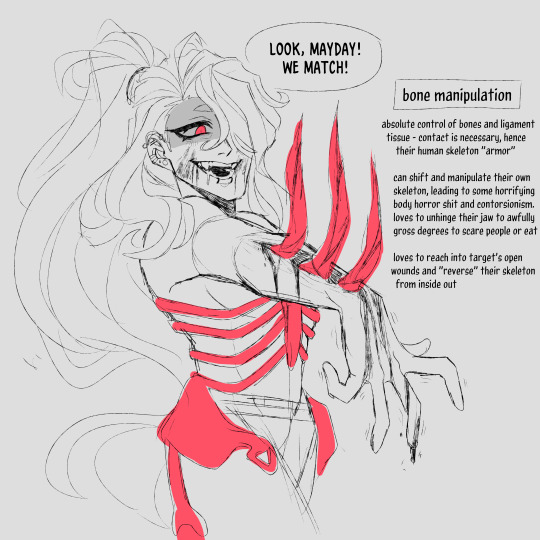
assortment of venison doodles
#reverse 1999#reverse: 1999#reverse 1999 oc#gore#body horror#purinsu art#very light gore id say but just to be sure#ALSO YEAA MAYDAY MENTION. NOMI'S RE1999 OC#HER AND VENISON ARE BUDDIES......#yes this is some TLT shit. i love bones!!!!! and harrow made me love them even more!!!!!!!!!#also i think medpoc and venison would. in fact. get along bc of how careless they are with their own bodies#when i say absolute control of bones i mean it. this mf has spent two decades doing nothing but dig around in dead animals and dead ppl#studying how anatomy works and how everything is supposed to work and move. just so they can bend and break every single 'rule'#venison is the messiest most unnecessarily violent fighter of spina venatores by a LANDSLIDE#i have many thoughts about them but rn im head empty
57 notes
·
View notes
Text
The thing about the Shazam! (Captain Marvel but they don't have the rights to call him that) movie is that overall it's pretty good? Even if I question the pacing choices made in terms of screentime breakdown for '14yo boys making mortifying life choices and humorously failing judgment calls' vs. 'character development wrt to literally anything else about this fairly large cast.'
It's hokey; it should be. It's got some decent themes and fun character bits and set up good solid hero/villain parallels to subvert.
But.
But it massively clotheslined itself with a major storytelling fuckup connected to the opening hook mystery, whose resolution is meant to be the emotional inflection point of the whole film.
Because the thing is, this movie chose to be slightly interesting in how it approached its 'family' themes. In a variation on 'family of choice' (since your foster family are in fact assigned by the government and Billy not having a choice about living with them only about trusting them is a major story element) it went for the more nuanced and kind of interestingly grimy take that the people who are actually in your life giving a shit about you matter, if you let them, and that you need to stop giving the people who failed to love you power over your happiness.
Which is not a bad premise at all! As messages for a movie about a kid being sent to a group home go, that's the most upbeat you could possibly get and still be tied to reality.
The Vasquez couple are written and played well in these terms too because they really, genuinely care, and are making so much effort, but as system graduates themselves they never had competent parenting modeled for them and god does it show.
And the mental health problems of the kids who got enough characterization to have them were similarly...realistic in a best-case-scenario sort of way.
But! Still with the but! Even though they pulled off a lot of this fairly touchy premise rather well, there's a crack in the foundation that makes the whole movie kind of collapse on a thematic level.
Because the movie (following the prologue introducing the villain's backstory) opens with a juicy emotional hook where small Billy is separated from his mother at a Christmas fair and never sees her again.
Cut to some years later, establishing status quo scene, he's a Troubled Youth rebelling against the system in an endless quest to find his mother and go home. He is committing minor felonies to get access to police information about women surnamed Batson so he can go to their houses because eventually one of them has to be his mom.
His case worker after he's picked up again refers to his mother as 'someone who clearly didn't want you,' which Billy rejects as bullshit, and he's valid! Because that is not what you say when you have actual information. That's a surmise. That's a sentence that says Child Protective Services and the police couldn't find her either.
Especially because you don't immediately chuck a kid into foster care because he's found unattended. Maybe you do that later, after a lengthy period of oversight, depending on his mom's reaction to having him returned and her race and socioeconomic status and apparent mental health and so forth. But you don't just not contact her, and you definitely don't refuse to tell the kid about the result once you have.
The only normal situation where an accessible record exists of a kid's original parentage but it's denied to the kid is in sealed adoptions, which are a formal procedure that clearly didn't happen here. There is every indication in this opening sequence that his mom was never found.
Which means she's a missing person. Either because they located the correct Billy Batson and his adult never came back to their house (which would suggest foul play or some other drama) or because despite being old enough to be in school and knowing his own name, no one could find evidence that Billy existed prior to turning up at that street carnival.
Which would constitute a very mysterious situation! What is he, from a cult? Another dimension? Did someone (in the social worker's proposed scenario, Billy's mom) erase all record of her kid somehow? Was magic involved?
So: the way we're introduced to this scenario, there's a legitimate weird mystery here that none of the adults in Billy's life care enough about to do anything but tell him to write it off, the way they have. That his missing person clearly did it on purpose.
Billy's being ridiculous because if what he's trying would work then he wouldn't need to do it; his social worker could have arranged a meeting years ago. So it's a useless self-destructive behavior he needs to let go. But he's valid, in that he's being very obviously failed by the system and is doing the only thing he can think of to try to address his situation for himself.
And then! The Big Reveal is that his mom has been living under her maiden name in the same city as him this whole time.
Which the Gamer Kid Who Turns Out In This Scene To Be A Hacker (he's about 10) learned by. Breaking into a federal database.
So he goes to her house and it turns out. She'd been a teen mother and her babydaddy walked out after marrying her, and her parents cut her off, and she was depressed and felt like a bad mother so. When she saw the cops had her kid, she just walked away. And she wants to believe he's been happy and better off without her.
And the emotional arc of the film rests on how Billy comes to terms with this. With the fact that his past will never take him back and he has to learn to find joy in himself and his present situation and his future.
Having let go of that idea, he's able to emotionally commit to his gaggle of foster siblings and realize that unlike the villain, who was obsessed with punishing the people who never loved or accepted him, or the wizard who was focused on finding The Perfectly Worthy Champion, what you needed to be good and not lost was to be part of a mutually supportive group, like the wizard Shazam was before he and his siblings were betrayed. And then they can be a superhero team, woo!
And that part is actually depicted fairly well, all things considered!
But the problem is that the audience, to vibe with this properly, has to roll with the revelation that Billy was wrong to cling to the mystery of his vanished, beloved mother and the fantasy of going home again.
We have to be willing to participate in the idea that the Resistant Child Subjected To Foster Care was in the wrong.
And he wasn't! He wasn't wrong! His understanding of the situation was flawed but it should not have been flawed in this manner.
Because this scenario as it's depicted doesn't make any sense. The cops do not just keep your kid without following up if you fail to collect him from the baggage claim. CPS does not fail to provide a kid with the readily available evidence that he's been voluntarily surrendered to them, when he keeps running off trying to go home.
Why would they do that, after all? Billy's misbehavior was a huge hassle for them. They gained nothing by denying him access to his mother and the information about her that was, you recall, sitting totally available in a government database that could be hacked by a random 10 year old asian-american orphan. They just...made their own lives harder for no reason, while extending the suffering of a child in their care.
If the cops tried to return him back when and she said 'no i left him with you on purpose please keep him' maybe she gets prosecuted for child abandonment and maybe not, but either way, billy would know about it.
But if the screenwriters had made it clear early on that this information had been offered to him and he'd chosen not to believe it, they couldn't get a proper Reveal at the end because it would just be Billy being unable to continue pretending something the audience had known not to believe all along.
And they couldn't cram a good reason for the scenario they'd set up into the space they'd accorded it.
So they were just like, it's fine, if we cram enough cliches into this space people will react to the familiarity and go 'ah yes i know this one' and go along with it, and not notice that this isn't an actual coherent reply to the question that was set up an hour ago and therefore is emotionally unsatisfying somehow.
Anyway this is an important storytelling guideline: if you put in a mystery to control either the actual plot or, even worse, the emotional storyline, that mystery and its resolution have to make internal sense.
If you pull the Real Situation out of your ass, and it's not a matter of red herrings or That One Fact you didn't have that makes all the rest fit together differently, but in fact no one involved could have figured this out and especially if the people who did say this in the first place had no good basis for it, but still get narratively awarded the Correct trophy in a way that contributes to the thematic climax so the audience has to care. Then that will not get good results. It will make it hard to deliver on your intended themes.
Some people will not notice or care! This is true! But a lot of people will, and you'll get enough of a better punch even with the other folks, if the setup and denouement fit together properly and don't require reaching, to matter.
And when people do notice at all, rather than their naturally flowing along with the climax you're steering toward and experiencing A Story, there will be a tendency to notice you standing there placing roadsigns toward the Intended Emotional Response, and call you a hack.
People call out plotholes way too vigorously sometimes, so I want to be clear: it's not the lack of supporting logic I mind. It's that the active presence of illogic, of what's presented as a chain but is broken along its length, means the central character arc intersects with the core theme in a noticeably forced way. Which is bad craftsmanship on a meaningful level.
There is a loss of cohesion where you cannot satisfactorily resolve how the scenario we were initially shown came to be superimposed over the revealed truth, because that relationship between elements is very important to making a 'revelation' storyline land, you know?
In this case it's particularly vexing to me because the last-minute asspull and its thematic weight reaches back around and at the last minute moves the whole movie thematically to the other side of the line wrt whether it's approaching Billy, our protagonist, as a subject with whom we're supposed to identify or an object whom we're supposed to observe.
It makes all the high-school-freshman-posing-as-adult gags retroactively less funny because we were now more explicitly laughing at him, and takes a lot of the depth out of the emotionally sincere moments.
Up to that point I had really appreciated how, despite wavering that way, Shazam! hadn't actually fallen to the MCU Spiderman temptation to dehumanize its protagonist. Which seems to arise out of this weird tendency I've noticed to assume the natural sentiment of adults toward adolescents is bemused contempt, and that therefore if they ask their audience of paying grownups to empathize too closely with a teen hero instead of setting him and his Immaturity up as a clown for our amusement, they'll get themselves banished to the Children's Fiction ghetto.
And, of course, if they'd been fully committed to one side or the other of 'Billy is a protagonist the viewer relates to closely' or 'Billy is a protagonist the viewer relates to distantly,' they wouldn't have gotten snarled up about how much information to hand over when.
Committing to either option (giving us only as much information as Billy had and constructing a story that was solid from a being-Billy angle or giving us more information than Billy and operating confidently in the realm of dramatic irony) could have worked quite well. But because of the mixed signals and unstable narrative distance, they wound up with a distinctly weakened finale.
#hoc est meum#in real life things happen that you have no good reason to expect all the time#but in real life we know they happened for some kind of reason as in#causality exists and even in situations where we can't dig into the chain#we have cause to understand that it's there#in fiction they happened because they'd be convenient#so the rules of what information can be available and how you frame new information being revealed exist#to keep the audience from feeling jerked around#you have to earn people's trust and if you lose it#that limits the kind of results you can get#when writing fiction one of your tools is the reader's mind#if you give them reason not to allow you free use of it your composition contracts#screenwriting#shazam#and like in this case there's a profound betrayal of the protagonist and thus of the audience who connected with him wrapped up in it
87 notes
·
View notes
Text
I AM A DWARF AND IM DIGGING A HOLE
DIGGY DIGGY HOLE DIGGY DIGGY HOLE
#i am a dwarf and im digging a hole#diggy diggy hole#:3#196#egg irl#traaa#rule#ruleposting#:3 hehe#r/196#dwarf metal#transgender#trans#trans propaganda#dwarf propaganda
48 notes
·
View notes
Text
everyone wants a distinct art style till you have to be really careful what you put on the internet cause your shit is so recognizable all your friends clock your stuff on sight.
I had a friend with no context clock the below as mine.

just based off the lineart
do we understand how hilarious and also dangerous that is for me.
#ive had THREE separate friends ACCIDENTALLY find me on tumblr#i didnt ask for this#i didnt even do it on purpose the style was an accident#thankfully at least two of them recognize tumblr rules and backed the hell away on site and didnt dig through my blog#the other i have enough blackmail on i forced to back down
37 notes
·
View notes
Note
Your 'Ghouls are Deaths hunting dogs' idea reminds me of the one guy who, when accused of being a werewolf, said that werewolves were the hounds of God who battled witches and demons. Anne Rice (yes, she of vampire fame) wrote at least two books with a similar premise (wolven shapeshifters that can smell evil and hunt only the wicked. The books are called 'The Wolf Gift' and 'The Wolves of Midwinter' BTW.)
Vampires VS Werewolves has always been a tasty concept. I could especially see a grudge happening in the Dracula canon, considering how happy the Count is to make slavering puppets of ordinary wolves and muscle them into danger and violence against their will. I've seen it done well in tons of monster mashing media, but it's kind of lost its flavor to me as a 'gimme' of supernatural horror.
But it'd be very fun to abuse the werewolf foe assumption based on 1) A lupine profile in the head and 2) Being seen munching on a corpse...
Only for the observer to realize that's a canine (even jackal or hyena-ish) head on those misshapen shoulders and that corpse it's ripping apart isn't a fresh kill. It's full of maggots. Or worse.
Dead, but not done being sentient.
Rest in pieces, Count de Ville. 🍽
#though frankly I'd like to play with as many monsters as possible in this bloodstained sandbox#just got to dig up some more old school stories on the subject#the main stuff I've seen has all been post-1900 and vaguely The Wolfman/Wolf Man-flavored#(yes I do have to force homework into my Rules-Free Imagination Land writing. I have to get a good grade in Referencing Old Lit or I'll die#werewolf#vampire#ghoul
22 notes
·
View notes
Text
As a Holt Hyde art completionist, I had to draw his outfit from the Gloom & Bloom webisodes, which, in the words of @armed-saphire , fucks and rules
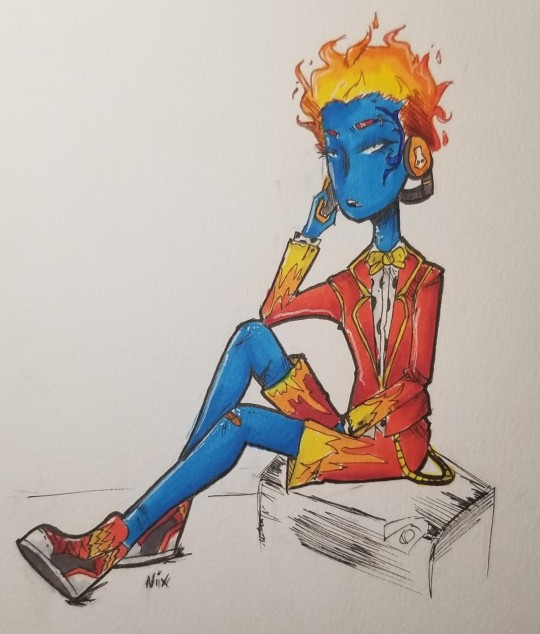
#monster high#holt hyde#hee ho ha ho im a funny lil art man#monster high fanart#nix devolving into madness hours#gloom and bloom#i. adore him wow#armedsaphire ur so right. this outfit fucks AND rules#shorts??? with a suit????#the madness!!! the disregard of societal norms!!!#i dig it#+ the sneakers??#holt hyde slayed as always#uh oh looks like someone got ditched at the monster prom and is calling his dad to come pick him up :(
28 notes
·
View notes
Text
look, I know taylor swift got all the rwrb girlies in a death grip and y'all have sold your souls to her but I am bernie voice begging y'all to throw some Spanish love ballads out there too like Alex is Mexican y'all don't think that boy knows who Selena Quintanilla is and wasn't listening to I Could Fall In Love With You on repeat after every meeting with Henry???? Please.
#red white and royal blue#rwrb#look i'm just saying can we get some musical variety up in here#every fic gifset and fmv is set to some swift number and like hey i dig enchanted#but alex would def not be a swiftie and he'd def grew up listening to marc anthony i don't make the rules#i could fall in love with you is such a beautiful ballad too#like that's one of their wedding songs don't even come at me#chaos pikachu speaks
35 notes
·
View notes
Note
Percy Jackson sings and the Romans are ready to cut each other themselves.
Jason takes him as a husband, not just out of love.
Are we talking about a "the Tyrant and his faithful monster" AU or a "Jason and Medea" AU (get it? Medea was a witch who was so in love with Jason (the original one) that she committed crimes) because yes.
#percy helping jason conquering the world with his siren voice i dig#yes jason is a tyrant i made nico a villain once i can damn well make him a vicious cruel power-hungry emperor#blame zeus i dont make the rules#hoo#pjo#toa#yone rambling#percy jackson and the olympians#heroes of olympus#trials of apollo#jason grace#percy jackson#jercy#siren percy
32 notes
·
View notes
Note
I still haven't forgotten about the smiling face in the thumbnail of the episode when Moon apologized to Ruin. It might be the typical "evil creepy smiling face" that any villain can use but it's also the same face that KC's model once had.
I stand with your KC theory, Socks!! Manifesting, manifesting, manifesting!!
-🥭
RIGHT???? WHAT WAS UP WITH THAT HUH THATS MORE KC (og anyway) FACE THAN RUINS HMN HMN???
#'its cause ruins messing with the arcades' YEAH BUT ALSO KC COULD BE IN THERE TOO!!!#anyway thank you mango the manifesting is real we'll get our man back#let a girl dream#and also dig deep into this theory where canon keeps telling me no-#shut up canon i make rules here AND IM SAYING KCS COMING#MARK MY WORDS HE COMINNN
18 notes
·
View notes